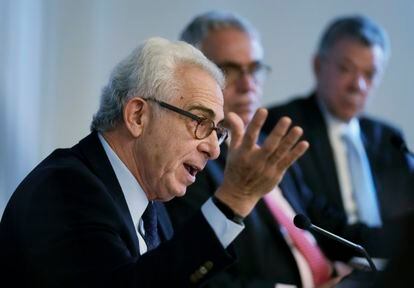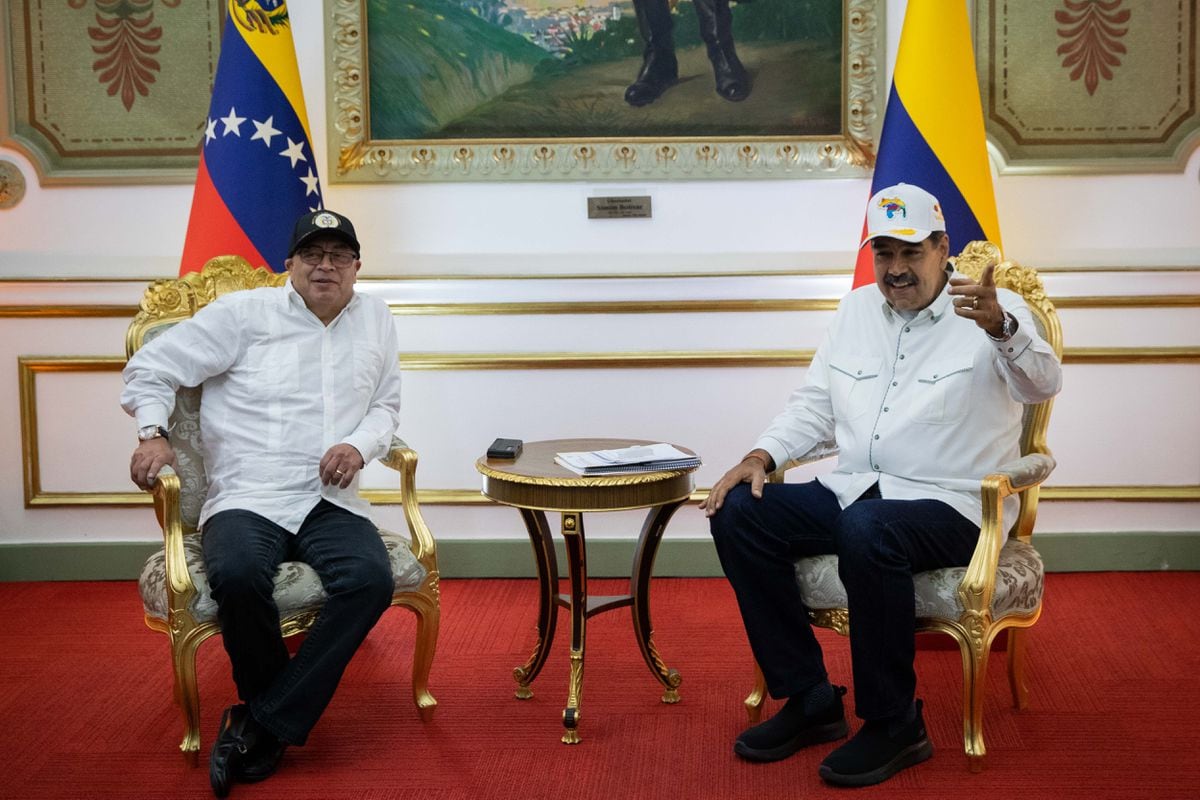Former Mexican President Ernesto Zedillo during a meeting of the Global Commission on Drug Policy, in Bogotá.
In the background, former Colombian President Juan Manuel Santos. Fernando Vergara (AP)
The fight against drug trafficking in the world and particularly in Colombia, the largest producer of coca leaf and cocaine, needs profound changes such as those requested by the Government of Gustavo Petro, the members of the Commission have pointed out this Wednesday with all the letters Global on Drug Policy.
"What we are seeing is the failure of the policy of prohibition," stressed former Colombian President Juan Manuel Santos, backed by the group of world leaders that brings together the commission, during a meeting with journalists in Bogotá.
"It is urgent that there be a paradigm shift in Colombia," insisted the also Nobel Peace Prize for the agreement that he sealed with the extinct FARC guerrilla.
The commission, created in 2011, is made up of 26 world leaders, including the former president of Switzerland Ruth Dreifuss –also present in Bogotá–,
the Spanish Javier Solana, who headed European diplomacy, and other ex-presidents of Latin America such as the Colombian César Gaviria, the Brazilian Fernando Henrique Cardoso or the Chilean Ricardo Lagos.
Among its founders was former UN Secretary General Kofi Annan, who died in 2018.
His report
Drug policy in Colombia: the path to fair regulation
, which he presented this Wednesday and is the first dedicated exclusively to a country, includes recommendations such as the legal regulation of drugs, an approach based on human rights and decriminalizing related activities, including consumption and cultivation.
He will also separate drug policy from the national security agenda and strengthen state institutions.
The document is a full-fledged accolade for the Petro Government's nascent anti-drug strategy, still under construction, on the eve of its first 100 days in power.
The current president of Colombia took advantage of his first speech before the United Nations General Assembly, in September, to launch a strong statement in that direction.
"I demand from here, from my wounded Latin America, to end the irrational war on drugs," he said then in New York.
Petro has asked to stop criminalizing the weakest links in the chain, the coca growers, and to focus efforts on hitting the criminal organizations that profit from drug trafficking, a claim in line with the paradigm shift that Santos was already calling for in the final stretch of his term (2010-2018), but it was interrupted in the period of Iván Duque (2018-2022).
“You have to take President Petro at his word,” said another of the members of the commission present this Wednesday in Bogotá to present the report, former Mexican President Ernesto Zedillo (1994-2000).
"The fundamental premise is that prohibition does not work, criminalization does not work, repression does not work, militarization does not work, and the proof of this is in the results," the former president insisted.
"Drug use must be decriminalized, and the supply must be regulated."
The total area allocated to coca crops in Colombia reached a historical record of 204,000 hectares at the end of 2021, before Petro came to power, according to the annual report of the United Nations Integrated Illicit Crop Monitoring System (Simci). ), introduced last month.
That figure marks the failure of Duque's strategy, who took a sharp turn in anti-drug policy.
While Santos advocated changing the focus in the global fight against drug trafficking, and called for addressing the problem as a matter of human rights and public health - including in his acceptance speech for the 2016 Nobel Peace Prize and in his interventions before the Assembly General—, Duke drew a harder line,
More and more voices point out that as long as there is consumption and prohibition, there will be mafias that profit from illicit income.
“Latin America has been suffering a phenomenon that we see from Mexico to Argentina, and it is the strengthening of organized crime,” Santos has elaborated on his diagnosis, who used to refer to the fight against drugs as a stationary bicycle due to its discouraging balance after half a century. of efforts.
In many areas of Latin America, he pointed out, who controls the territory is not the State, it is organized crime, which ends up weakening democracies.
In Colombia, the peace agreement sealed at the end of 2016 “brought hope that a new era would come, but due to a change in political power and, therefore, in political will, implementation has been uneven and unsuccessful. in general, especially when combined with the limitations imposed by the ban itself,” says the report's prologue, signed jointly by the two former Colombian presidents who are members of the commission, Santos and César Gaviria (1990-1994).
Given the record numbers of coca cultivation and production, the Petro Administration has anticipated that the agreements with the FARC mark the roadmap for a policy of crop substitution.
His new perspective on drugs aims to pacify the territories, but at the moment he does not contemplate legalizing the trade and trafficking of cocaine.
Subscribe here
to the EL PAÍS newsletter on Colombia and receive all the key information on the country's current affairs.


/cloudfront-eu-central-1.images.arcpublishing.com/prisa/USUWDBG7JJHATL4LN5CDIOB4XE.jpg)





/cloudfront-eu-central-1.images.arcpublishing.com/prisa/HSRQ3QW76RB3DOESR7EIXEEB4U.jpg)